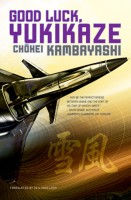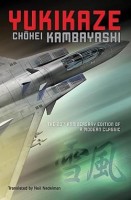 Author: Chōhei Kambayashi
Author: Chōhei Kambayashi
Translator: Neil Nadelman
U.S. publisher: Viz Media
ISBN: 9781421539010
Released: July 2011
Original release: 1999
Awards: Seiun Award
Good Luck, Yukikaze is Chōhei Kambayashi’s second Yukikaze novel as well as his second novel to be released in English. A sequel to Yukikaze—which was originally written in 1984 before later being revised—Good Luck, Yukikaze was published in Japan in 1999 after being serialized between 1992 and 1999. Like Yukikaze, Good Luck, Yukikaze was translated into English by Neil Nadelman and released by Haikasoru, Viz Media’s speculative fiction imprint. The English edition of the novel was published in 2011 and also includes a concluding essay with commentary by Maki Ohno. The Yukikaze novels are some of Kambayashi’s most well-known and respected works. Yukikaze wold earn Kambayashi a Seiun Award when it was first written and Good Luck, Yukikaze would receive the same honor after its publication as well. I found the first Yukikaze novel to be thought-provoking and so looked forward to reading its sequel. A third volume in the series also exists, Unbroken Arrow, however it has yet to be translated into English.
Despite humanity’s best efforts the war against the JAM, a mysterious alien force, has continued for more than three decades. Although the end of the fighting is nowhere in sight, some progress has been made, especially in regards to the technology, computers, and weapons that humans employ. But those advances could possibly lead to humanity’s obsolescence and are a threat to its existence. Rei Fukai was one of the best pilots in the Special Air Force, but he was left in a coma after his highly advanced fighter plane Yukikaze took the initiative and ejected him during battle against his will. Eventually he awakens, bu he continues to suffer from the immense psychological blow—Yukikaze was the only thing beyond himself that he trusted and he was betrayed and discarded; he struggles to come to terms with all that has happened to him. Meanwhile the war goes on, as does Rei’s personal battle against the JAM. Like it or not, he and Yukikaze have caught the invaders’ attention.
When I read Yukikaze it took a few chapters before the novel was able to completely engage me, and so I wasn’t initially concerned when Good Luck, Yukikaze failed to immediately grab my attention. I kept waiting and waiting for the moment when it would finally all come together for me, but that moment never seemed to arrive. In fact, I found myself growing more and more frustrated with Good Luck, Yukikaze as a novel the more that I read. If I hadn’t already had some investment in the story and characters from reading the previous novel, I’m not sure Good Luck, Yukikaze would have been something that I would have been interested in—at least as fiction. The problem was that, despite a few intense action scenes, very little actually happens in Good Luck, Yukikaze. The characters seem to spend most of their time talking in circles, over and over again, interrupting the flow of the narrative. I approached Good Luck, Yukikaze expecting a novel, not a philosophical treatise.
Even though Good Luck, Yukikaze can be a bit of a slog at times, and even though I didn’t particularly enjoy it as a fictional narrative, the tremendous ideas, concepts, psychologies, and philosophies that Kambayashi explores through the novel are undeniably fascinating and thought-provoking. Good Luck Yukikaze challenges the characters’ and readers’ understanding of the nature of reality and what it means to exist. In the novel, Kambayashi examines the often tumultuous relationship humanity has with the technology and it has created, and speculates on the direction that relationship is taking as humans struggle to maintain control and autonomy. Computers have become so incredibly advanced that the line between true consciousness and artificial intelligence is blurring. One of the central questions posed by Good Luck, Yukikaze is if it even matters if there is or isn’t a difference between the two, or if functionally it’s simply the next logical evolutionary step.

